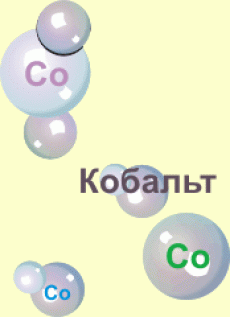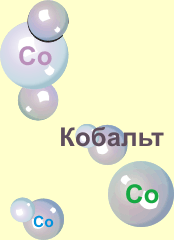Medical expert of the article
New publications
Preparations
Cobalt
Last reviewed: 04.07.2025

All iLive content is medically reviewed or fact checked to ensure as much factual accuracy as possible.
We have strict sourcing guidelines and only link to reputable media sites, academic research institutions and, whenever possible, medically peer reviewed studies. Note that the numbers in parentheses ([1], [2], etc.) are clickable links to these studies.
If you feel that any of our content is inaccurate, out-of-date, or otherwise questionable, please select it and press Ctrl + Enter.

Cobalt, like all microelements, is very useful for the human body. It affects hematopoiesis, takes part in the synthesis of biological substances. But to learn all its useful properties, let's get to know it better.

 [ 1 ]
[ 1 ]
General information about cobalt
The beginning of the 20th century was marked by an event: scientists found vitamin B12 in the liver of animals. Interestingly, it consists of 4% cobalt. As it turned out later, vitamin B12 is a biologically active form of cobalt, and its deficiency in the body is characterized by a deficiency of vitamin B12.
Cobalt in the human body is found mainly in the liver, a small amount of it is found in the lymph nodes, adrenal glands, kidneys, pancreas and thyroid gland. Its total mass is 1-2 mg.
Cobalt is also found in the blood, but its concentration varies depending on the season: usually this concentration fluctuates around 0.07 - 0.6 μmol/l. This difference is explained by the fact that in the summer a person eats more vegetables and fruits, which significantly increases the cobalt content in the blood.
The need for cobalt every day
Every day, you need to consume 0.1 to 1.2 mg of cobalt through food.
The beneficial effects of cobalt on the body
Cobalt significantly affects metabolism and hematopoiesis. Due to the fact that it is part of vitamin B12, in its absence the process of protein, carbohydrate and fat breakdown, DNA and amino acid synthesis are disrupted, and this affects the functioning of the nervous system. The work, growth and development of blood cells - erythrocytes, directly depends on the cobalt content in the body.
Cobalt is necessary for the proper functioning of the pancreas and the secretion of adrenaline. Thanks to it, iron is well absorbed by the walls of the stomach, and the deposited iron (Fe) passes into the hemoglobin of erythrocytes. Cobalt also helps to absorb protein nitrogen and stimulates the synthesis of muscle protein.
Interaction of cobalt with other elements of the body
Cobalt helps absorb iron (Fe). It is also part of vitamin B12.
Signs of cobalt deficiency in the body
If cobalt does not enter the body in sufficient quantities, a person may develop endocrine system diseases and circulatory problems.
Signs of excess cobalt in the body
If there is an excess of cobalt in the body, the disease cardiomyopathy can develop along with heart failure.
What influences the cobalt content of foods?
The cobalt content of food depends on its amount in the soil.
Why might cobalt deficiency occur?
A deficiency of this element in the body can occur if a person has chronic diseases such as gastritis, cholangiocholecystitis or duodenal ulcer.
Products containing cobalt
Fish is very rich in cobalt. To increase the level of this element in your body, eat tuna, cod, sardines, pike or flounder more often. Both sea and river fish contain from 20 to 40 mcg of cobalt. Squid contains the largest amount of cobalt - as much as 95 mcg!
Attention!
To simplify the perception of information, this instruction for use of the drug "Cobalt" translated and presented in a special form on the basis of the official instructions for medical use of the drug. Before use read the annotation that came directly to medicines.
Description provided for informational purposes and is not a guide to self-healing. The need for this drug, the purpose of the treatment regimen, methods and dose of the drug is determined solely by the attending physician. Self-medication is dangerous for your health.

